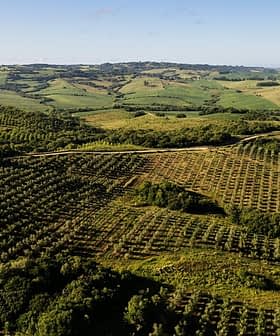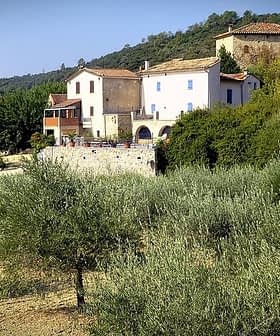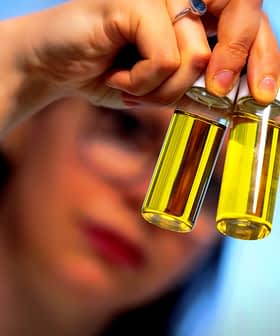Their sandwiches are a favorite of Oprah Winfrey. Inc. Magazine hailed them as “the coolest small company in America.” Food & Wine has declared them one of the 25 best food markets in the world. Zingerman’s co-founder Ari Weinzweig helped propel the company from a corner deli in Ann Arbor, Michigan to a star in America’s booming specialty food industry — a community of businesses with over 500 employees and roughly $36,000,000 in annual sales. In the process, Zingerman’s has become what the Atlantic Monthly calls “the country’s leading olive oil purveyor.” Weinzweig sat down with Olive Oil Times to talk about Zingerman’s approach to selecting and marketing this complex product – and his favorite ways to eat it.
What is it about Ann Arbor that makes it a good home base for Zingerman’s?
Well, I think you could probably do this anywhere. I guess I don’t really know because we don’t do it, but I know I like Ann Arbor. It’s full of interesting people, and everybody knows you get a lot of the advantages of high-quality urban life in a small town. You’ve got an airport where you can fly anywhere in the world, but you don’t have to live in a big city.
Are people here more attuned to different flavors and foods?
I don’t know. I don’t do business anywhere else, so I don’t really know. But we have a lot of great customers here, and we like it here.
Do you remember the first time you tried good olive oil?
I can. Maggie Bayless, she’s now the managing partner of Zing Train, our training business, gave me one as a gift when I was a cook at Maude’s. It was Old Monk olive oil – it’s still out there as a brand. It was the first time I had extra virgin oil.
How do you choose which olive oils to sell at Zingerman’s?
Well, everything we do here is always traditional food, and full-flavored food. And full-flavored for us means complexity, balance and finish. So that’s the core of how we choose. And then we try to have a selection of regions and olive oil varietals. But the flavor is what we’re going on, and then you back up to the content, which is what kind of olive varietals when it was picked, how it was picked, how it was pressed. All food tasting is really the same to me, whether it’s chocolate, wine, cognac, vinegar, cheese – you’re always looking for the same things: complexity, balance and finish. Professional tasters have, you know, 20 characteristics that they name. I mean, that’s good too, but for us it’s those three.
Do you have a panel of tasters?
Well, everybody’s involved. It’s not like a fancy thing, but yes, we do. We don’t sell anything without mindfully tasting it and deciding we like it. All our employees here are involved – everyone who works here, whoever wants to come. You have to taste like 50 to get one. Technically, me and the managing partners here probably have the final say, but the manager of the area really is who’s deciding in practice, and we’re just all in there talking about it. And anybody who wants to participate can come and taste and learn.
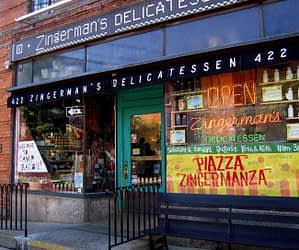
Well, you don’t necessarily know which one’s the best. The challenges are all the same ones of doing business. I mean, it’s an agricultural product, so each year’s different. Some suppliers are less dependable in their shipping. Stuff gets lost, trucks tip over, shipments break. You know, many times we’re buying from very small producers, so we’ve got to commit at the beginning of the year to how much we want. And you’re not always right, you could have too much or too little.
Do you gravitate toward smaller producers?
Yeah, generally – not always – but as a generalization, smaller production can often be correlated with higher quality.
Do you go for any big producers, or exclusively smaller ones?
Well, we go by how it tastes. And if it’s in the mass market, it’s less interesting to us, but if it tastes fantastic, we would probably get it anyway. But generally, once you hit those lower price points, it’s not going to taste that great.
Which affordable but great-tasting olive oils would you recommend?
Well, I still often recommend the Colavita, which is out in the mass market. There’s also one from Argentina called Trianna. But sort of the next tier up is really what we focus on, because there’s so much mass-market olive oil. But I think if you go and taste most of those (mass-market oils), most of them don’t taste that great.
If you go to the next tier up, which producers stand out?
Oh, there’s millions of them. There’s one we just started to get, which is a project we’re doing with Walter Hewlett, who owns Owens Creek Ranch in California. His grandfather was a cardiologist here at the (University of Michigan), so four dollars from every bottle goes as a donation to UM Cardiology. And the olive oil is quite good. The one we’re getting right now is Sicilian varietals.
What’s your personal favorite?
Well, I don’t have favorites. I like ‘em all, really, or I wouldn’t sell them. There’s so many. Right now the Pasolivo and Owens Creek from California are both really nice. There are some very nice Spanish ones that we’re getting right now – Castillo de Canena has been very good, and there’s Naturvie from the west. And Moulins Mahjoub from Tunisia we’ve been using a fair bit. I’m sure I’m forgetting a bunch, but that’s a good start. Really, everything over there is good, or we wouldn’t have it.
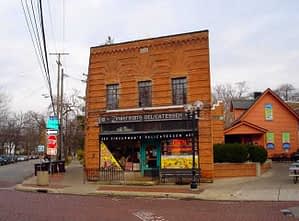
Yeah. It was that way in local areas, but it’s certainly that way more now. There are two things that have happened. One is that you have newer people who have started producing it. And then you have people who have always produced olive oil, and who used to sell it off to bigger co-ops or whatever, and who have stopped that and started selling it on their own. And as they start to separate out their oil and sell it directly, they have a much higher focus on the quality of the oil, because it’s got their name on it. And they’re actually working on a much higher level of attention to detail.
Do you find that that has improved the selection of olive oils on the market?
Yeah, and I think it’s true with all foods, too. When you produce something but you don’t know who’s eating it, and your name’s not on it — it’s not malicious, it’s just a natural thing that you’re not going to focus on every detail. Like I’m sitting here (in the Zingerman’s deli), and every single customer knows if what we’re selling is good or not, and if it’s not good we’re in trouble.
What kind of changes have you seen in gourmet food retailing, especially as it concerns EVOO?
Well, I think awareness and understanding are far higher than they used to be. People just know a lot more. We have kids coming in, five year olds, who know what a good olive oiltastes like. It’s not hard – it’s just that once you get used to good, you know good.
Why do you think that is?
Parents are just more educated about it, and kids have been coming in here since they were born. It’s just normal for them. I mean, the question is, why would anybody eat bad olive oil? It’s just that we didn’t know any better. But nobody mindfully goes from good to bad, unless they can’t afford it.
Have recent efforts by California producers to discredit imported olive oils had any effect on your buying habits?
There’s good and there’s bad everywhere. There are people who produce at the low end of the market everywhere, and in every product, and there’s people who produce on the high end. I think California oils are way better now than they used to be.
When and why did they start getting better?
Well, they started getting better probably 20 years ago, but they really have been way better in the last five, six, seven years. Because there’s not really a tradition of producing great olive oil there – I mean, there is a little bit. So you didn’t have the technology or the expertise. But one thing about the U.S. is that once people decide they’re going to get good at something, they get good faster than anywhere else in the world, probably. And they did.
Are you buying more California oils than you used to, then?
Yeah.
How much olive oil do you sell in a year?
NOTE: Weinzweig referred this question to Vanessa Sly, Dry Goods Manager at Zingerman’s Deli, who responded with the following – referring only to olive oil sold through the Deli:
“We sold approximately 8,400 bottles of olive oil for a total of $247,000 in sales. We currently carry 64 different olive oils, and with some of them we have several different sizes (250ml, 500ml, 1L). Our average price is $29.99 and average size is a half liter. Of those 8400 bottles, just shy of 2000 are of Spanish origin, about 5500 are Italian, and 750 were made here in America. The rest are from Australia, New Zealand and Tunisia. We only carry 4 oils from France, but they constitute 16% of the total bottles sold.”
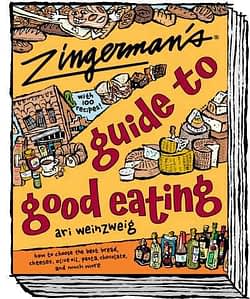
NOTE: Weinzweig referred this question to Brad Hedeman, who handles Marketing & Product Selection at Zingerman’s Mail Order who told us: “For 2009-10, we did about $420,000 in olive oil sales, which was about 5% of our entire year’s sales.”
Do you pay attention to olive oil competitions, and does that affect your buying decisions at all?
No, usually it’s more the other way. We’ve already bought stuff, and then it’s nice when it wins awards. I don’t place a lot of stock in judges – for anything. Because there are times when stuff has won that I don’t think is spectacular. Less so with olive oil. But if something doesn’t taste good, it doesn’t matter whether it won. If we don’t like it, we don’t like it. But generally, it’s more the other way. The ones we like win awards. I think it helps, I mean, it doesn’t hurt. But we don’t stock olive oil based on whether it’s won awards.
What’s your favorite way to eat or cook with olive oil?
All ways. On salads, on pastas, on fish. I eat it pretty much every day.
Any particular breads you like with it?
Ours. (laughs) Well, we make a lot of good breads, I’m pretty spoiled.
How do you educate customers?
Classes, newsletters, everything’s open for people to taste. I wrote a book about it – well, a little book about olive oil which got rolled into Zingerman’s Guide to Good Eating as a chapter. But we have everything open to taste, so it’s very normal for people to come in and taste six, seven, eight, or ten olive oils. You can go over there and do it right now!
(NOTE: I did – they were delicious.)
Thank you for your time. Anything else you’d like to say to our readers?
Just that good olive oiltastes really great, and I hope people continue to learn to love it as much as we do.


